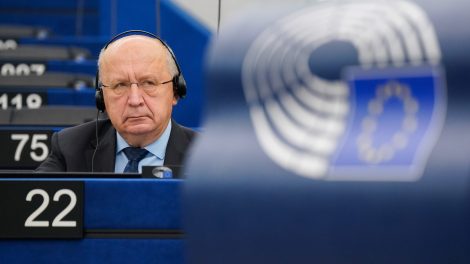A joint push. On Tuesday, Italian Minister of Enterprises and Made in Italy, Adolfo Urso, and French Minister of Industry and Energy Marc Ferracci reaffirmed their commitment to overhauling the EU’s Carbon Border Adjustment Mechanism (CBAM).
- The two ministers met in Paris on the sidelines of the Artificial Intelligence Summit, underscoring their strategic alignment on key industrial policies.
- The two countries will present a joint request to include CBAM reform as a central topic at the upcoming EU Competitiveness Council on 6 March, with the aim of ensuring that the mechanism does not hinder European industry’s competitiveness, particularly in energy-intensive sectors such as steel and chemicals.
In his words. “Our countries share the need to revise CBAM immediately to safeguard our industry’s competitiveness in the decarbonisation challenge,” Urso stated.
- “We cannot afford to let strategic European sectors suffer due to a system disregarding global competitive conditions. Europe must not depend on external actors for essential materials and technologies.”
- The ministers also addressed the EU’s industrial strategy, advocating for a transition that supports sustainable production without imposing disproportionate burdens on manufacturers.
- Urso reiterated the importance of a technologically neutral approach to the automotive industry, ensuring biofuels remain a viable option post-2035.
Towards strategic autonomy. During a separate meeting with French Minister of Economy Éric Lombard on Monday, Urso highlighted the urgency of reducing Europe’s reliance on external actors in strategic sectors.
- “Europe must act with cohesion, both in dialogue with the US and in countering China’s industrial dominance,” he stated. “A strong, competitive Europe is the only way to safeguard our economic future.”
- Italy has been actively shaping EU industrial policy, leading proposals on regulatory simplification (with the Netherlands), CBAM revision (with Poland), automotive strategy (with the Czech Republic), space policy (with Germany), and microelectronics (with the Netherlands).
- The government is also considering joining France-led initiatives in steel and chemicals.
- Space was another key discussion point, with Urso emphasising Europe’s lag in satellite infrastructure.
- “By the time IRIS² is fully operational, Europe will have around 290 low-Earth orbit satellites, compared to over 40,000 in the US,” he noted. “Closing this gap is essential for European strategic autonomy.”
A human-centred AI. Representing the Italian government at the summit in Paris, Urso called for Europe to adopt an AI development path that prioritises human well-being and security, positioning Italy as a leader in ethical AI regulation.
- “Europe must chart its own course, distinct from the US and China, by ensuring AI serves humanity in a safe and inclusive manner,” he stated.
- “This is the approach Italy has embedded in its legislation and championed during its G7 presidency with the AI Hub for Sustainable Development.”
- The AI Hub, a partnership with the UNDP, aims to foster responsible AI adoption in emerging economies, particularly in Africa.
- It focuses on energy, agriculture, healthcare, water, education, and infrastructure, promoting AI as a tool for inclusive growth rather than deepening inequalities.
- Urso also underscored Italy’s strengths in high-performance computing and quantum technologies.
- “Italy hosts two of the world’s most powerful supercomputers, Cineca in Bologna and Davinci in Genoa. These capabilities are crucial for data security and digital autonomy. Europe must invest in supercomputing to retain control over its technological future.”
Europe’s next frontier. Responding to European Commission President Ursula von der Leyen’s announcement of the InvestAI initiative, Urso emphasised Italy’s pivotal role in quantum technology development.
- “Building four AI-focused gigafactories is a crucial step, but Europe must also lead in quantum computing. Italy has the expertise to drive this forward,” he stated.
- “This is the best response to US concerns that overregulation could stifle investment. Europe must be an active player alongside the US in shaping AI’s future,” he added.





